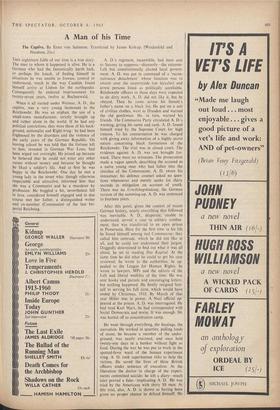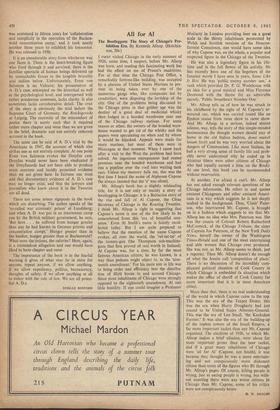A Man of his Time
by James Kirk up. (Weidenfeld and The Captive. By Ernst von Salomon. Translated Nicolson, 21s.)
Tuts nightmare fable of our time is a true story. The man to whom it happened is alive. He is a German who had the fantastically harsh luck, or perhaps the knack, of finding himself in situations he was unable to foresee, control or understand, much in the way Candide found himself arrive at Lisbon for the earthquake. Consequently he endured imprisonment for twenty-seven years, twelve at Buchenwald.
When it all started under Weimar, A. D., the captive, was a very young lieutenant in the Reichswehr. He was an orphan, the son of a small-town manufacturer, strictly brought up and rather alone in the world. If he had any political convictions, they were those of his back- ground, nationalist and Right-wing: he had been frightened by the disorders and the violence of the early years of the German Republic. On leaving school he was told that the fortune left to him, invested in German War Loan, had been wiped out overnight. He joined up because he believed that he could not enter any other career without money and because he thought he liked a soldier's life. And at first he was happy in the Reichswehr. One day he met a young lady in the street who, though otherwise respectable and attractive, informed him that she was a Communist and he a murderer by profession. He boggled a bit, nevertheless fell In love, considered himself engaged and in due course met her father, a distinguished writer and ex-member (Communist) of the late Im- perial Reichstag. A. D.'s regiment, meanwhile, had been sent to Saxony to suppress—discreetly---the extreme- Left but constitutionally elected local govern- ment. A. D. was put in command of a 'recon- naissance detachment' whose function was to swarm over the countryside (on bicycles) and arrest persons listed as politically unreliable. Reichswehr officers in those days were expected to do dirty work. A. D. did not like it, but he obeyed. Then he came across his fiancee's father's name on a black list. He put on a suit of civilian clothes, went to Dresden and warned the old gentleman. He, in turn, warned his friends. The Communist Party circulated A. D.'s warning, giving his name and rank. A. D. found himself tried by the Supreme Court for high treason. To his consternation he was charged with giving away information of a highly secret nature concerning black formations of the Reichswehr. The trial was in closed court. The evidence against A. D. was not brought for- ward. There were no witnesses. The prosecution made a vague speech, describing the accused as a naïve young man who had fallen into the clutches of the Communists. A. D, swore his innocence; his defence, counsel asked no ques- tions whatsoever and merely spoke for thirty seconds in mitigation on account of youth, There was no Urtellsbegriindung, the German version of the summing-up. A. D. was sentenced to fourteen years.
After this point, given the context of recent German history, nearly everything that followed was inevitable. A. D., desperate, unable to understand, served a year in solitary confine- ment, then was transferred to an open prison in Pomerania. Here for the first time in his life he found himself among real Communists; they called him comrade, which he did not like at all, and he could not understand their jargon. Doggedly determined to find out what it was all about, he set to reading Das Kapital. At the same time he did what he could to get his case reviewed; he wrote to the authorities, he ap- pealed to the League for Human Rights, he wrote to lawyers, MPs and the editors of the Left and liberal weeklies of the time. He was sent books and parcels and encouraging letters; but nothing happened. He finally resigned him- self to serving his full term, which would have ended by Christmas, 1933. By March of that year Hitler was in power. A Nazi official ap- peared at the prison. A. D. was interrogated. He had read Karl Marx, he had corresponded with Social Democrats and worse. It was enough. He was hurled off to concentration camp.
He went through everything, the beatings, the starvation. He worked in quarries, pulling loads of stone; he became a member of the under- ground, was nearly executed, and once held twenty-one days in a bunker without light or food. During the war he was put to work in the spotted-fever ward of the human experiment wing. A. D. took superhuman risks to help the victims. He saved the lives of three British ffi ocers under sentence of execution. At the liberation the doctor in charge of the experi- ments committed suicide; he left a diary—much later proved a fake—implicating A. D. He was tried by the Americans with thirty SS men. At this trial, also, A. D. is shown as having been given no proper chance to defend himself. He
was sentenced to fifteen years for 'collaboration and complicity in the operation of the Buchen- wald concentration camp,' and it took nearly another three years to establish his innocence. He was released in 1950.
It is an unendurable story from whichever way one faces it. There is the heart-breaking figure who lived through it and survived; there is the familiar spectacle of human beings delivered up by unreachable forces to the tangible brutality and sadism below. Unfortunately, Ernst von Salomon is no Voltaire; his presentation of A D.'s case, attempted on the historical as well as the psychological level, and interspersed with rather ponderous comment, lacks clarity. It also sometimes lacks corroborative detail. The crux of the story is obviously the trial before the Supreme Court of Germany, the Reichsgericht at Leipzig. The enormity of the misconduct of justice there is surely such that it required rather more chapter and verse than we are given in the brief, dramatic and not entirely coherent account in the book.
The same can be said of A. D.'s trial by the Americans in 1947, the account of which also strikes one as not entirely complete. At one point Ernst von Salomon evokes the Dreyfus case. Dreyfus would never have been vindicated if the Dreyfusards had not been able to produce more concrete and lucidly presented evidence than we are given here. In fairness one must add that documentary evidence of A. D.'s case may no longer exist, and that the lawyers and journalists who knew about it in the Twenties are all dead.
There are some minor signposts in the book which are disturbing. The author speaks of the 'so-called war criminals' prison' at Landsberg; and when A. D. was put in an internment camp run by the British military government, he says, 'But here . . . he suffered from hunger greater than any he had known in German prisons and concentration camps.' Hunger greater than in the bunker, hunger greater than at Buchenwald? What were the rations, the calories? Here, again, is a tremendous allegation and one would have liked to have chapter and verse.
The importance of the book is in the fearful warning it gives of what may lie in store for anyone, repeat anyone, if we allow anything, if we allow expediency, politics, bureaucracy, thoughts of safety, if we allow anything at all to tinker with the rule of law. We are all poten- tial A. D.s.
SYBILLE BEDFORD















































 Previous page
Previous page